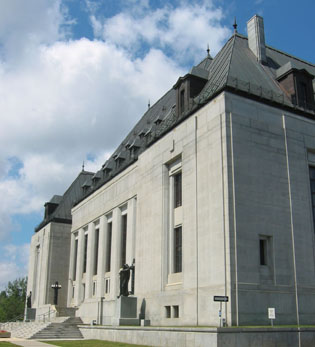 The Supreme Court of Canada will hear the following seven appeals this week:
The Supreme Court of Canada will hear the following seven appeals this week:Oct. 17 — Ontario — Manasie Ipeelee v. R.
Criminal law: Manasie Ipeelee was found intoxicated while riding his bike downtown and in possession of alcohol. He pleaded guilty to breaching a condition of his long-term supervision order to abstain from alcohol. The judge sentenced him to 2.5 years in prison and six months of pre-sentence custody. The Court of Appeal dismissed the appeal. At issue is whether the judge gave sufficient consideration to the fact that the applicant is aboriginal and whether the sentence would differ between an aboriginal and non-aboriginal offender.
Oct. 17 — British Columbia — R. v. Frank Ralph Ladue
Criminal law: Frank Ralph Ladue was convicted of break and enter and sexual assault. He was released on a long-term supervision order. He later pleaded guilty to breaching the order by failing to abstain from intoxicants. The judge sentenced him to three years in prison. The Court of Appeal reduced his sentence to one year, ruling that the sentencing judge didn’t consider his aboriginal heritage and didn’t properly emphasize rehabilitation. Similar to the previous case, the main issue surrounds sentencing aboriginal offenders.
Oct. 18 — British Columbia — Catalyst Paper Corp. v. Corp. of the District of North Cowichan
Municipal law: Catalyst Paper Corp. challenged the District of North Cowichan’s property tax rates, claiming the rates were unreasonable because they have no relationship to the municipal service it uses or consumes. Catalyst sought a declaration that the property tax rate is illegal but the judge dismissed the petition. In question is whether a municipality has legislative discretion, including setting property tax rates, without statutory criteria.
Oct. 19 — Nova Scotia — Halifax Regional Municipality v. Nova Scotia Human Rights Commission
Charter of Rights and Freedoms: After Halifax and Dartmouth amalgamated Halifax was required by law to continue funding the Halifax Regional School Board. The Conseil Scolaire Acadien Provincial school board, for French-language schools, didn’t receive supplementary municipal funding. One of the respondents, Lucien Comeau, whose children attended a French school, filed complaints with the Nova Scotia Human Rights Commission alleging discrimination as a person of Acadian descent. Other parents challenged the provincial legislation in court and the N.S. government offered to amend the legislation so that both school boards receive the same funding. The human rights commission appointed an inquiry board, which Halifax successfully quashed. The main issue surrounds supplementary municipal funding for different school boards.
Oct. 20 — Manitoba — Nor-Man Regional Health Authority Inc. v. Manitoba Association of Healthcare Professionals
Labour law: An employee filed a grievance claiming she was denied certain vacation benefits, which violated the collective agreement she had with her employer, Nor-Man Regional Health Authority Inc. Nor-man maintained that casual time was excluded in calculating annual vacation time. The union held that casual time should be included. In question are collective agreement provisions relating to casual employees and annual vacation time.
Oct. 20 — Ontario — Mark Whyte v. R.
Charter of Rights and Freedoms: Based on an informer’s tip to police, Mark Whyte was arrested for various firearms offences without a warrant. At trial, evidence in regards to the firearms was excluded because his Charter rights had been violated and he was acquitted. The Court of Appeal overturned the trial judge’s decision and entered convictions. The main question is whether the trial judge erred in his decisions.
Oct. 21 — British Columbia — Franklin Shane Dorfer v. R.
Criminal law: Franklin Shane Dorfer was convicted of breaking and entering a dwelling house and committing sexual assault. He admitted to the break and enter but not the sexual assault, accusing another individual. The majority of the Court of Appeal dismissed the appeal. The main question is whether the judge improperly instructed the jury on the use of the accused’s criminal record and evidence of bad character.
The SCC will also release its decisions in the following two cases this week:
Oct. 19 — British Columbia — Wayne Crookes v. Jon Newton
Oct. 20 — Ontario — Robert Katigbak v. R.







